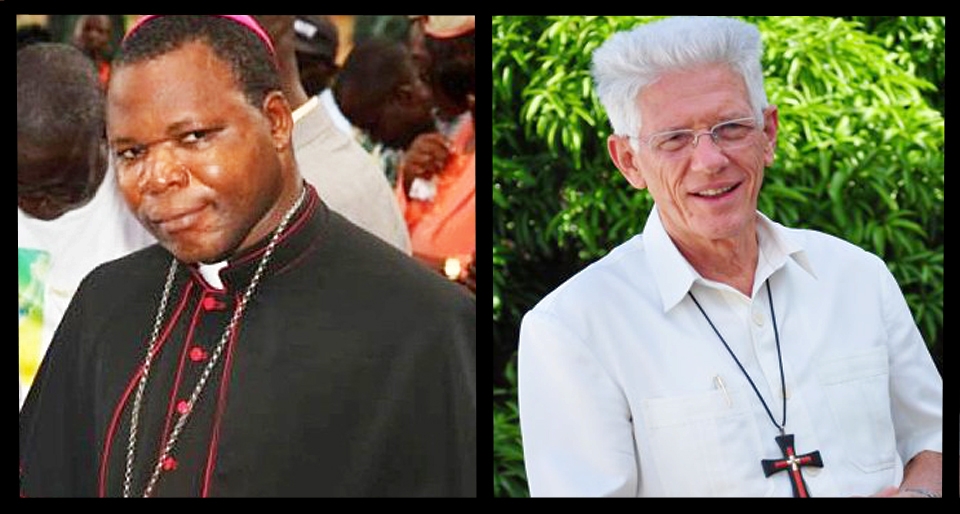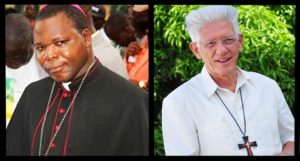

Msgr. Dieudonné Nzapalainga (left) and Msgr. Maurice Piat (right). The pair of African archbishops are the first Spiritans appointed to the Vatican’s College of Cardinals.
Raymond Arke | Asst. News Editor
Spiritan priests are a mainstay on Duquesne’s campus. Now, for the first time, the order will be represented in the prestigious College of Cardinals.
On Oct. 9, Pope Francis announced the appointment of 17 new Cardinals during his regular Sunday address to St. Peter’s Square. Monsignor Maurice Piat, the Archbishop of Port-Louis, Mauritius, and Monsignor Dieudonné Nzapalainga, Archbishop of Bangui in the Central African Republic, have become the first two Spiritas to be named by the pope as cardinals.
Mauritius is a small island nation off the east coast of Madagascar in the Indian Ocean. The Central African Republic is located, as the name implies, in the center of the African continent and has never produced a cardinal before.
Rev. John Sawicki, a Spiritan priest and professor of political science and international relations at Duquesne and the treasurer for the U.S. congregation of Spiritans, explained the significance of the appointments.
Sawicki said being named a cardinal is a “highly honorific” title. While it’s a mostly an administrative position, being a member of the College of Cardinals allows one to vote in papal elections. A cardinal can only serve until he turns 80 and Piat is already 75, Sawicki said, which makes the selection of Monsignor Piat “highly unusual.”
Sawicki believes the selection of Piat is to honor his years of work on various Catholic organizations in the Indian Ocean.
“This is the recognition of his long service to the Bishops of the East Indian Ocean… [Piat] has really been a Roman Catholic administrator for decades,” Sawicki said.
Piat himself is surprised with the news. In a press release from the U.S. Spiritans, the Mauritius native is quoted as saying that he “was certainly not expecting it … I ask you to pray for me, you my brother and sister Mauritians, both Christian and those of other religions.”
Sawicki was also impressed with the choice of Monsignor Nzapalainga to the College of Cardinals. Nzapalainga is 49 and will be the youngest cardinal in the college, Sawicki said.
“He will vote in many papal elections,” he said.
Sawicki said that Nzapalainga was only ordained in 1998. Nzapalainga will also become the first cardinal from the Central African Republic.
Mauritius has also never had a cardinal before Piat. Kate Lecci, a Spiritan campus minister, said the pope “hit the nail on the head” with Piat’s appointment.
“It’s reflective of Pope Francis’ papacy in that attention to the small and sometimes less influential people in our Catholic Church,” Lecci said. “[They] are being lifted up, and him being one of them … To give attention to a small island like Mauritius is really wonderful.”
Even more unique is Nzapalainga’s personal involvement in the ongoing civil war in his home of the Central African Republic.
“He is instrumental in personal negotiations with various militia groups,” Sawicki said, praising Nzapalainga’s “relentless courage.” The volatile situation in the country has claimed at least the life of one Spiritan brother there, Sawicki noted.
Rev. Jeffrey Duaime, provincial of the Congregation of the Holy Spirit Province of the United States, lauded the Pope’s inclusion of the two Spiritan brothers.
“The nominations … [were] not about the big cities and traditional ‘cardinal’ sees, but about the importance of the church on the peripheries,” Duaime said.
Duaime said these men were picked for a reason. The two new cardinals “come from ‘far edges of the world’ in true Spiritan fashion,” he said.
Duaime thought that Piat and Nzapalainga are perfect representations of what a Spiritan is.
“They are typical Spiritan missionaries who have given their lives to the liberation of peoples around the world along with the promotion of dialogue and respect between those of different faiths,” he said.
Both of the priests work for peace, he added.
“Nzapalainga has distinguished himself as working tirelessly to bring about peace in a country dominated by war between Christians and Muslims … while Bishop Piat is known for his ability to provide a message of faith, hope and unity in the Hindu-dominated country of Mauritius,” Duaime said.
Surprisingly, Piat has a connection to Duquesne. Bishop Piat was studying and living at Duquesne University in 1991 when he received the news that he was chosen to be Bishop of Mauritius, according to Duaime.




